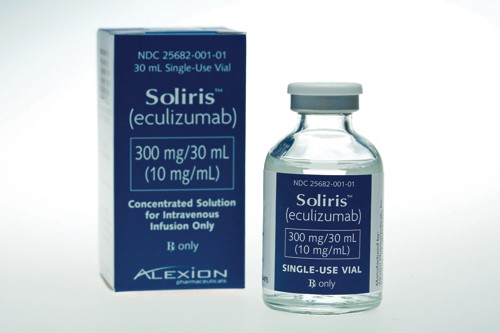
Alexion has gained a new FDA approved used for its rare disease blockbuster Soliris.
The US regulator approved Soliris (eculizumab) yesterday to treat neuromyelitis optica spectrum disorder (NMOSD) in adult patients who are anti-aquaporin-4 (AQP4) antibody positive.
NMOSD is an autoimmune disease of the central nervous system that mainly affects the optic nerves and spinal cord.
“Soliris provides the first FDA-approved treatment for neuromyelitis optica spectrum disorder, a debilitating disease that profoundly impacts patients’ lives,” said Billy Dunn, M.D., director of the Division of Neurology Products in the FDA’s Center for Drug Evaluation and Research.
“This approval changes the landscape of therapy for patients with NMOSD. Having an approved therapy for this condition is the culmination of extensive work we have engaged in with drug companies to expedite the development and approval of safe and effective treatments for patients with NMOSD, and we remain committed to these efforts for other rare diseases.”
NMOSD disproportionately affects young women in the prime of their lives, with the average age of first onset at just 39 years. Another significant risk factor for disability and mortality in NMOSD is race: in the U.S., African Americans are over-represented among patients diagnosed with NMOSD and more likely to suffer more frequent and more severe attacks.
Previously known as Devic’s Disease, NMOSD is often confused with other neurological illnesses such as multiple sclerosis (MS), which can lead to delays in diagnosis and treatment with medicines that can worsen disease progression.
Estimates vary, but NMOSD is thought to affect around 4,000 to 8,000 patients in the US. The approval was granted under orphan drug designation, which will help extend the drug’s market exclusivity period.
Soliris’ revenues hit $3.56bn last year, up 13% as Alexion added Generalised Myasthenia Gravis (gMG) to its two main indications, paroxysmal nocturnal haemoglobinuria (PNH) and atypical haemolytic uremic syndrome (aHUS).
The drug has already had its patent period extended in the US extended until 2027, giving Alexion significantly longer to ramp up sales of its successor treatment, Ultomiris, which gained FDA approval in December in PNH.
Approval in NMOSD is expected later this year in Europe and in 2020 in Japan.
Soliris will nevertheless still face competition in the coming years from new challengers from the likes of Apellis, Roche, and Regeneron among others.




